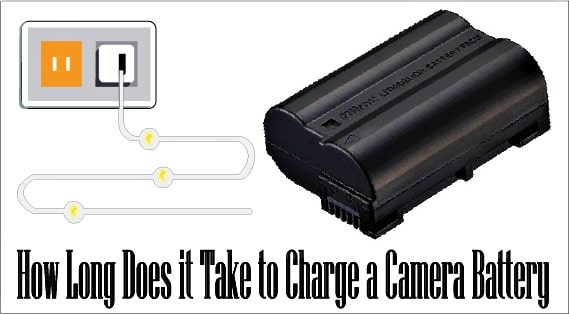
As a photographer, you may want to know how long does your canon camera battery last? I also wanted to know so I tried an easy experiment to know the approximate that a Canon camera takes to fully charge.
Then I realized that most of you may also want to know about it. Therefore, I am sharing my review here. I took a few Canon cameras including LC-E6, LP-E6NH, and E6N, and tested their battery’s charge and drain time. I am going to share the results below.
Table of Contents
How Long Does a Canon Battery Take to Charge?
In short, a typical canon battery takes approximately 120 minutes or 2 hours to fully charge at room temperature, but this time varies depending upon the charger, battery’s capacity, battery’s health, and temperature.
The best temperature to charge a Canon Battery is 6°C – 10°C or 43°F – 50°F which will likewise take longer to charge, approx. 4 hours.
How Long Does a Canon Battery Take to Fully Charge (Exact Time)?
Honestly, there is no absolute time, your camera’s battery takes to charge as it varies from battery to battery. There are few reasons on which the charging time depends including ambient temperature, the health of the battery, battery size and quality, and type of charger.
At lower temperatures, it takes longer to fully charge as compared to room temperature. At room temperature, my LC-E6 to 2hrs to fully charge. The LP-E6N took 2hrs and 10 min to fully charge and the E6NH took 2hrs and 47 minutes when exhausted.
Factors Affecting Charging Time of Canon Batteries
Several factors affect the charging time of a camera battery. Some of these are given as under:
The capacity of the Battery
The charge time widely differs depending upon the capacity and quality of the battery. If the battery has a bigger capacity, it is obviously taking more time to charge fully and if the battery capacity is low, it will take less time to fill the space.
BatteryCapacityAmbient Temperature (°C/°F)Charging Time (Hours Min)
Canon LC-E6 | 1800mAH | 23°/73° | 2hrs 00min |
Canon LP-E6N | 1865mAH | 23°/73° | 2hrs 10min |
Canon LP-E6NH | 2130mAH | 23°/73° | 2hrs 47min |
Quality of the Battery
Likewise, if the battery is of good quality and manufactured by a reliable brand, it will charge quicker and in case of poor quality, it will charge slower as it will not support fast charging and will charge with difficulty. More Info
Method of charging
Charging time depends on the mode of charging. For example, if you are using a standard Canon charger, it will charge the battery quicker. Similarly, if you are using another low-quality charger, it will take longer to charge the camera’s battery.
Additionally, it also depends on the cable’s quality. If the cable is of high quality, it will help in fast charging and vice versa. Also, if you are using a wireless charger, then let me tell you that it is slower than wired charging.
The point is that if you use a different charger, the charging time is going to vary. Suppose you are charging LP-E6NH batteries at room temperature. If you are using a standard charger, it will charge the battery in 2hr 47min. The same batteries take 12 minutes longer in PD-E1 Power Adapter which takes 2hr 59min to fully charge the battery.
The battery’s recharge performance
The runtime of Li-ion batteries degrades with time. The performance of the batteries is also affected by the no. of recharge cycles and charge conditions like temperature etc.
Therefore, due to degradation, the internal resistance of these batteries is increased. That’s why a battery may require a longer time to fully charge. Also, if the battery is more degraded and cannot be fully charged, then it will fill up in less time and will also drain quickly.
Ambient temperature
If you are a cellphone user, then you will know that the battery of your smartphone drops drastically in low temperatures. This is not just smartphone ability but is the effect of Li-ion batteries. These batteries are affected by the surrounding temperatures.
The manufacturing brands of these batteries suggest a temperature of 20 to 30 degrees centigrade. This temperature can vary from 20 degrees centigrade to 30 degrees centigrade, but you should keep batteries and an optimal temperature of 20-26°C or 68-78°F.
Back to the point, the charging time of a battery is somehow affected by the ambient temperature. At higher temperatures, the camera batteries take less time to fully charge, and in case of war temperatures, the camera’s batteries take slightly more time to fully charge.
When I tested the cannon LP-E6N with a Canon LC68 charger, it took two hours and 10 minutes to fully charge at room temperature. when I charge the same battery that is slightly high temperature, second it took 2 hours and 8 minutes to fully charge which is 2 minutes less when charging at room temperature.
Although charging speed increases with increasing temperature but I would not recommend doing it intentionally because it will affect your battery. it damages the battery and reduces the capacity and its life cycle. In case of excessive heat, you can completely damage the camera’s battery.
At temperature, the camera gives a false positive message the battery is full which is not, therefore, reducing the usable capacity of the battery. thus it will require more frequent charging and you won’t be able to tax to get the expected batteries battery life.
The case is the same for low temperatures, as the charge is intentionally reduced in the batteries. This will on one hand prevent over-heating but, on the other hand, increase the charging time. Also, charging at lower temperatures promote lithium plating which can result in permanent damage to the batteries.
The remaining Battery Capacity
The charging rate also depends upon the remaining charging capacity of the battery. If the battery is 10 to 20% charged, then it will charge faster. On the other hand, have the battery’s percentage is 90%, it will take longer for the rest 10% as compared to the start 10%.
How to Charge a Canon Camera Battery?
First of all, get the battery out of the camera. For that purpose, you push the battery pop-open button down and it pops open. After that grab the battery out. You can add another battery if you want. Then put the drained battery in an external charger and plug it to feed the battery.
Frequently Asked Questions (FAQ)
How long should I charge the EOS LP-E6 camera battery?
The Canon’s LC-E6 charger takes about 2hrs to fully charge an exhausted LP-E6 at room temperature. This charging time varies with temperature. At higher temperatures, the charging time slightly decreases and in the case of lower temperature, the charging time slightly increases.
How long should I charge my EOS LP-E6N camera battery?
Even the new cameras stop the charging at 99%, but still, you should not overcharge the batteries. The Canon’s LC-E6/LC-E6E takes about 2hr and 10min to chare the LP-E6N at a lower temperature. Therefore, you should charge it at the exact time.
How long should I charge my EOS LP-E6NH camera battery?
The E6NH takes about 2hrs and 47 mins to charge fully at room temperature when charging with LC-E6/LC-E6E. For the safety and reliability of the battery charge the camera at a lower temperature and don’t overcharge the batteries.
How long does a camera battery last before needing replacing?
When properly taken care of, the camera batteries should last at least for 5 years. On paper, the Li-Ion batteries last about 1000 recharging cycles. Keep the battery’s charge level between 20% and 80% to keep the battery active as long as possible.
When to charge a camera battery
A camera battery especially a Li-Ion battery should be charged when it reaches 20% and should be charged till 80% if you don’t have to shoot for long. Keeping the battery level between 20-80% makes sure that the battery will be safe from any kind of complication that usually occurs in the camera batteries.
Why will my camera battery not charge?
When you completely discharge a Li-Ion battery, there is a chance that the camera will fail to charge. Therefore, it is not recommended to overcharge or completely drain the batteries. Also, batteries degrade when stored for a long time, and also rust can be there to prevent charging.
Can a camera battery overcharge?
Modern cameras come with a feature to automatically stop charging when the charge level reaches 99%. Even though the camera stops charging the batteries but there is still a chance that some charge particles will slip into the battery therefore, it is not recommended to overcharge the batteries for a long time.
You can more clearly understand this by visiting our detailed guide about charging cameras. To visit Click Here.
Final Verdict
Here we are going to conclude our post and hope that now you can make a guess of how long canon battery takes to charge fully. If you have any queries, feel free to ask in the comments. Also, provide us with your review about this post down in the comments too.

